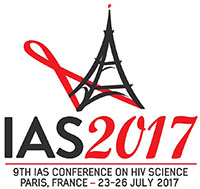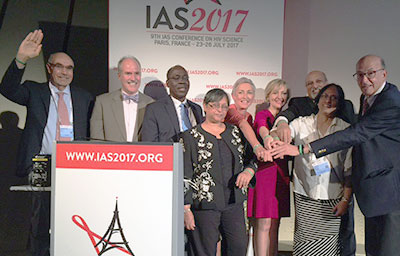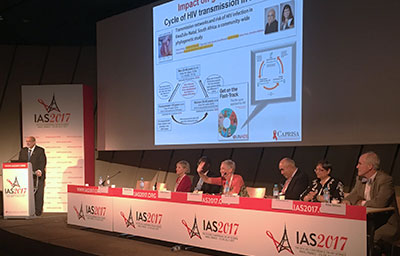Grantees assess long-term benefits of Fogarty training during session at global AIDS meeting
September / October 2017 | Volume 16, Issue 5
 The biomedical research enterprise in many developing countries has been transformed through decades of support from Fogarty's programs, which have provided training for thousands of scientists, improved early disease detection capacity, launched scores of collaborations and produced numerous scientific breakthroughs. Through personal stories, statistical analyses and scientific examples, senior Fogarty grantees presented compelling evidence of the long-term impact of the Center's programs at a session held during the recent International AIDS Society (IAS) conference in Paris.
The biomedical research enterprise in many developing countries has been transformed through decades of support from Fogarty's programs, which have provided training for thousands of scientists, improved early disease detection capacity, launched scores of collaborations and produced numerous scientific breakthroughs. Through personal stories, statistical analyses and scientific examples, senior Fogarty grantees presented compelling evidence of the long-term impact of the Center's programs at a session held during the recent International AIDS Society (IAS) conference in Paris.
"I've seen firsthand the pivotal, central and critical role Fogarty played in building the science base in southern Africa to enhance the response to both the HIV and TB epidemics," said Dr. Quarraisha Abdool Karim, who co-chaired the panel discussion marking Fogarty's 50th anniversary, together with the Center's Deputy Director, Dr. Peter Kilmarx.

Fogarty staff and supporters celebrated 50 years of the Center's
accomplishments at the International AIDS Society meeting in Paris.
Fogarty was prescient in anticipating in the mid-1980s what the clinical trials capacity needs would be as the HIV/AIDS epidemic spread across Africa and other low- and middle-income countries (LMICs), observed Abdool Karim, who is associate scientific director for the Center for AIDS Program of Research in South Africa (CAPRISA). A longtime Fogarty grantee, she said being able to build a critical mass of well-trained researchers created the opportunity for cutting-edge questions - relevant both locally and globally - to be asked and answered. Fogarty's research training programs helped foster international collaborations and effective mentee-trainee relationships, she said. "I think when we are dealing with a global problem, it's really important [to consider] how do we bring the best brains together and how do we work in a synergistic manner?"
In addition to encouraging young people to pursue scientific careers, Abdool Karim said Fogarty support helped establish strong research institutions "that create a very solid foundation to generate an evidence base for smarter and more efficient decision making." That has helped ensure the $70 billion the U.S. has allocated to the HIV response in LMICs has been spent wisely, she noted. When the President's Emergency Plan for AIDS Relief (PEPFAR) was rolled out, many of the people who implemented the program on the ground were former Fogarty trainees, she said.
As Ebola, bird flu, Zika and other challenges emerge, LMIC scientists are essential to global security. "This whole notion of early-warning signals, early responses to epidemics, they are also offshoots of this investment that was initially training for building clinical research capacity," Abdool Karim noted.
In Haiti, Fogarty trainees have been "essential" to progress in HIV prevention and treatment research, said Dr. Jean William (Bill) Pape, director of GHESKIO, the world's first institution dedicated solely to fighting HIV/AIDS. Pape looked back at some of the most significant scientific advances that GHESKIO has achieved with the help of several generations of Fogarty trainees. "There was a time when some prominent scientists didn't want antiretroviral therapy (ART) to be used in LMICs because they feared lack of adherence to treatment protocols would increase drug resistance." He and his colleagues showed in a series of landmark studies that Haitians living with HIV can follow complicated ART regimens, resulting in survival rates on a par with those in the U.S. These findings paved the way for widespread provision of ART in low-resource settings, saving millions of lives.
A Fogarty fellow himself from 1989-1990, Pape's nearly three decades of Fogarty funding has enabled him to train hundreds of researchers. He says these scientists have, in turn, provided instruction to some 16,000 health care workers, helped scale up HIV and TB models to the national level, and notched up numerous firsts, including the establishment of Haiti's national laboratory, the creation of the country's national public health program and the introduction of a nurse practitioner initiative.

Fogarty grantees presented compelling evidence of the long-term impact
of the Center's programs at a session held during the recent International
AIDS Society (IAS) conference in Paris.
In Africa, "Fogarty has really changed the game" and has had a great impact on HIV/AIDS policy and practice, according to Dr. Salim (Slim) S. Abdool Karim, CAPRISA director and longtime grantee. Fogarty trainees have contributed to significant research that has advanced the understanding of the HIV transmission cycle, led to new interventions to prevent transmission, and discovered how broadly-neutralizing antibodies are manufactured by HIV, which might be harnessed for a vaccine to prevent AIDS. He says the latter is an example of the multiplier effect of Fogarty, with three generations of trainees and mentors carrying this promising work forward over two decades. "This has been a rolling stone that's gathering a lot of moss along the way and generating a whole slew of really exciting young scientists."
There was little opportunity to conduct research during his medical studies, said Dr. James Hakim, professor at the University of Zimbabwe. The situation has improved, helped thanks to a program Fogarty helped establish in 2010 designed to strengthen medical education across Africa. The Medical Education Partnership Initiative (MEPI), supported by PEPFAR and NIH, was transformative and created a vital regional network that continues today, Hakim reported. The MEPI awards improved the quality and quantity of medical school graduates, increased faculty retention and promoted regionally relevant research, he said.
Another former trainee described how Fogarty support opened a whole new world of science and discovery for her when she was merely "an inconsequential, young African doctor." Now deputy director of the Desmond Tutu HIV Centre - as well as IAS president - Dr. Linda-Gail Bekker said the four years she spent in the late 1990s earning her Ph.D. at Rockefeller University in New York City propelled her career forward. "The wonderful combination of being able to move north-south meant that I was able to access the best animal facilities, leading laboratories, really engage in translational science in inspirational settings, establish great networks, get linked into academia, while able to leverage the disease burden at home - an unbelievable set of opportunities."
Worries about how to cultivate young African scientists today are what keeps Dr. Glenda Gray awake at night. A former Fogarty trainee and grantee, Gray is now president and CEO of the South African Medical Research Council, responsible for ensuring the quality of her country's clinical researchers. The pipeline of scientists is not robust, she said. "The research opportunities and the need for research currently outstrip our ability to develop world-class scientists in Southern Africa," Gray continued. "This is the time that we need Fogarty more than ever."
The Center remains firmly committed to its research training mission, its director Dr. Roger I. Glass assured the gathering. "We at Fogarty think that investing in capacity building, in future researchers, is perhaps one of the most influential contributions we can make to advance HIV studies and the entire global health agenda."
More Information
To view Adobe PDF files,
download current, free accessible plug-ins from Adobe's website.